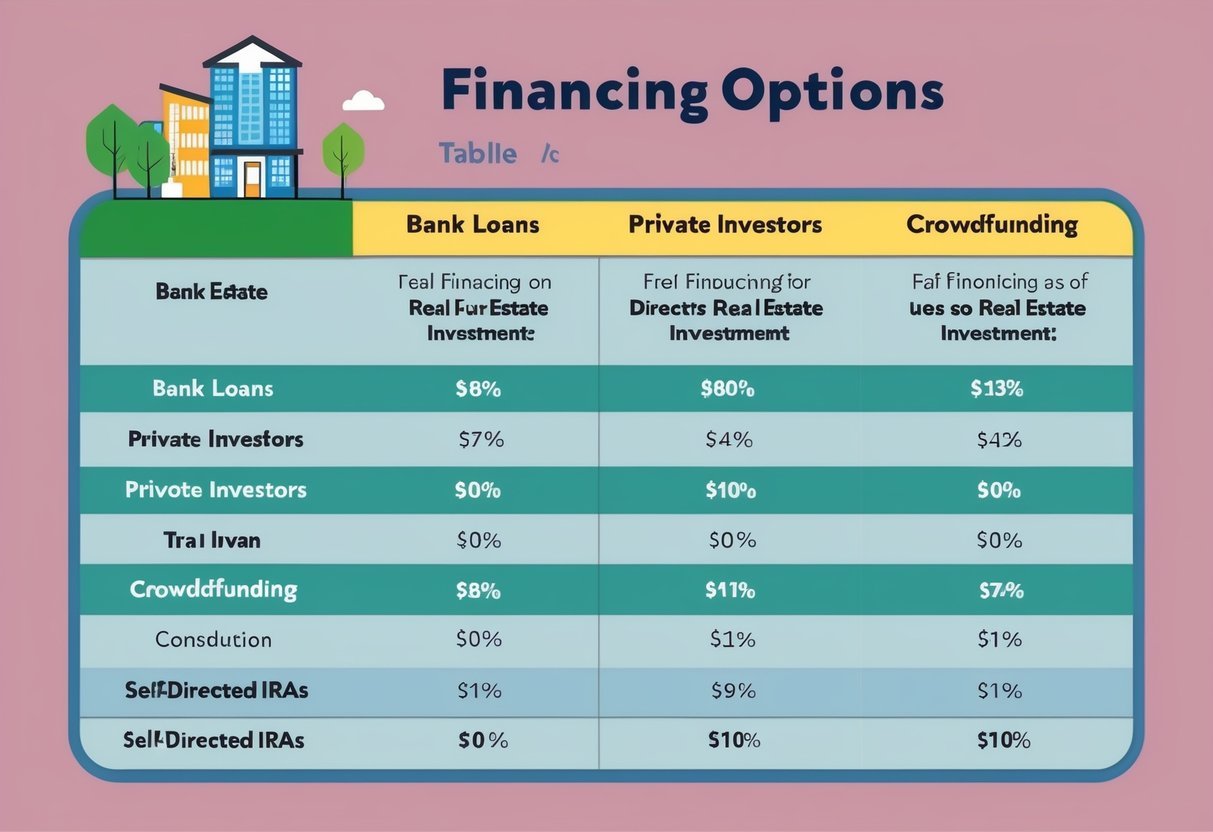Venturing into the world of real estate investment can be both exciting and daunting.
As we explore different financing methods, understanding how to begin can greatly assist potential investors who seek to purchase their first investment property. Accessing the right financial resources is crucial for turning real estate investment aspirations into tangible success.

Navigating the various options for financing is key to enhancing your investment strategy.
Whether you’re a new investor or have been considering this leap for a while, examining diverse financial pathways allows us to make informed decisions that align with our investment goals.
1) Personal Savings
When considering our first real estate investment property, utilizing personal savings can be a prudent approach.
This initial funding source provides a strong foundation, reducing the need for additional financing.
Using our own funds means we avoid interest rates and loan terms set by lenders, offering greater control over the investment.
By saving diligently over time, we can accumulate the necessary capital to cover down payments, closing costs, and other initial expenses related to the purchase.
This financial stability allows us to make sound decisions based on the property’s potential profitability.
Moreover, investing with personal savings often results in faster closing processes, as we eliminate the need for loan approvals.
This can be a significant advantage in competitive real estate markets where timing is crucial.
It’s essential for us to evaluate our financial capabilities realistically.
While using our personal savings can minimize debt, we must ensure we retain a sufficient emergency fund to manage any unforeseen expenses that may arise during the investment process.
Ultimately, leveraging our personal savings offers flexibility and reduces financial strain, paving the way for a successful first real estate venture.
2) Hard Money Loans
Hard money loans serve as an efficient financing alternative for real estate investments.
These loans are typically secured through private investors or companies, unlike traditional bank loans.
Their main advantage is the rapid access to funds they offer, which can be crucial when a quick purchase decision is needed.
The terms of hard money loans are often more flexible than those associated with conventional loans.
We can negotiate the loan terms based on the specific property and its current value rather than on our credit score.
This can be particularly beneficial when dealing with properties that may not initially qualify for bank loans.
Interest rates for hard money loans are usually higher than those of traditional loans.
It’s essential for us to factor in these costs when considering this financing option.
The increased rates reflect the higher risk that lenders take on by offering funds without thorough evaluations typical of bank processes.
In terms of duration, hard money loans are generally short-term, often ranging from a few months to a few years.
This makes them especially suitable for fix-and-flip projects where the property is quickly improved and sold.
We must ensure we have a clear exit strategy to repay the loan within the specified period.
Hard money loans can be a valuable tool in specific situations.
Understanding the particulars of these loans will help us determine if they align with our investment objectives.
These loans may not be suitable for all investors, but they provide an alternative path to funding that bypasses the stringent requirements of traditional lending avenues.
3) Private Money Lenders

When considering options for financing our first real estate investment property, working with private money lenders can be a valuable strategy.
These lenders typically consist of individuals or private companies willing to lend capital, often at higher interest rates, in exchange for more flexible terms compared to traditional banks.
Private money lending offers a speedier process.
This is particularly beneficial in hot real estate markets where quick funding can mean the difference between acquiring a property and losing it to another buyer.
The reduced bureaucratic hurdles often found in traditional banking are minimized, enabling us to move forward swiftly with our investment plans.
Additionally, private money lenders often assess deals based more on the property’s value and potential rather than our credit history.
This opens opportunities for those who might not meet the stringent criteria of conventional lenders.
Rehabilitating properties or covering short-term financing needs becomes significantly easier with this type of funding.
Networking is crucial in finding reputable private money lenders.
We can connect with these lenders through real estate events, investment clubs, or local real estate agents who may have established relationships.
It’s essential to build trust and demonstrate our investment’s potential to secure favorable terms.
In our experience, private money loans can come with higher interest rates and shorter repayment periods.
To effectively leverage this financing method, we should carefully evaluate the deal’s profitability to ensure that the terms align with our financial goals and investment timeline.
4) Real Estate Partnerships

Exploring real estate partnerships can be a strategic way to finance our first investment property.
By joining forces with other investors, we can pool capital, share responsibilities, and leverage each other’s strengths.
This collaboration often allows us to undertake projects that might be too substantial to manage alone.
Effective communication is vital in these partnerships.
Crafting a comprehensive agreement helps clarify roles, responsibilities, and the financial framework.
Outlining how profits and losses will be shared among partners prevents potential disputes.
Clear terms set the foundation for a successful and smooth partnership.
Real estate partnerships also offer the benefit of shared risk.
By dividing both the financial burden and operational tasks, we mitigate the impact of potential failures, making our venture more resilient.
Partners can contribute unique skills, which can enhance the overall success of the investment.
It’s important to be mindful of taxation.
Generally, partnerships require filing an entity-level tax return, and partners are taxed on their individual share of the profits.
This differs from sole ownership, where we would report all net income on a personal tax return.
Understanding these implications is crucial in planning.
By choosing a partner whose goals align with ours, we can maximize the benefits and minimize potential conflicts.
Together, we can access greater capital and expertise, allowing us to pursue more ambitious projects than we could alone.
Engaging in real estate partnerships thus provides a viable route to successfully finance our first investment.
5) Home Equity Line of Credit (HELOC)

A Home Equity Line of Credit, or HELOC, offers a flexible way to finance our real estate ventures.
By using the equity from our current home, we can secure a line of credit that acts like a revolving account, giving us access to funds as needed.
When considering a HELOC for real estate investments, we must evaluate our credit score, property equity, and debt-to-income ratio.
These factors influence our eligibility and the terms we might receive.
A strong financial profile can lead to more favorable interest rates and conditions.
HELOCs offer benefits such as interest-only payments during the draw period.
This can help manage cash flow more effectively as we only pay interest on the amount we use.
It’s critical to navigate the risks, such as fluctuating interest rates and the potential of over-leveraging our property.
Another advantage is that a HELOC can be applied to various investment purposes.
Whether we plan to improve existing properties, make a down payment on new ones, or cover unexpected expenses, having accessible credit can be instrumental in our investment strategy.
Before proceeding with a HELOC, it’s wise to compare it with other financing options like home equity loans or cash-out refinancing.
Each option has distinct features that could better suit different financial situations and goals.
Understanding Financing Options

Exploring financing options is crucial when investing in real estate.
Two popular methods include traditional mortgages and private money lenders, both offering unique advantages for first-time investors.
Traditional Mortgages
Traditional mortgages remain a cornerstone in real estate financing.
These loans, offered by banks and financial institutions, typically have fixed or variable interest rates and require a good credit score for approval. We usually see these loans with terms ranging from 15 to 30 years, providing a stable repayment structure.
Borrowers will often need a down payment, commonly around 20%, though options with lower down payments may be available.
The reliability of traditional mortgages lies in their fixed-rate structure, offering predictable monthly payments.
However, approval processes can be stringent, often requiring thorough documentation of income, assets, and credit history.
For new investors, exploring government-backed loans like FHA or VA loans can be beneficial, as they may offer more flexible requirements and lower down payment options than conventional loans.
Private Money Lenders
Private money lenders offer a more flexible approach to real estate financing.
These lenders can be individuals or small groups willing to provide capital for investment properties and usually are part of our local investment network.
Terms are often negotiated between the borrower and lender, allowing for personalized agreements.
Interest rates from private lenders might be higher compared to traditional loans, reflecting the increased risk they take on.
Despite this, private money lending can provide quicker access to funds with fewer approval hurdles.
This method is particularly attractive for those unable to secure traditional financing due to credit issues or those seeking to close deals rapidly.
Networking within real estate circles can be a valuable way of connecting with potential private lenders.
Financial Preparation and Planning

In embarking on a journey toward real estate investment, being financially prepared lays the groundwork for success.
Maintaining a healthy credit score and creating a detailed budget are fundamental steps.
These ensure that we are both aware of our financial standing and strategically set to achieve our investment goals.
Assessing Your Credit Score
Understanding our credit score is crucial before securing financing for a real estate investment.
A strong credit score enhances our chances of obtaining favorable loan terms.
This involves regularly checking our credit reports for accuracy and disputing any discrepancies.
Additionally, it’s important to manage existing debts responsibly.
Paying bills on time and reducing outstanding debt can positively impact our credit score.
These efforts not only improve our financial standing but also signal reliability to potential lenders.
Ultimately, a strong credit profile can lead to better mortgage rates and conditions, making it a pivotal part of our financial preparation.
Creating a Real Estate Investment Budget
Creating a comprehensive investment budget is essential for understanding our financial capacity and limitations.
This budget should account for various costs such as down payments, closing fees, and ongoing maintenance expenses.
Anticipating these costs helps us avoid surprises and align our investment decisions with our financial reality.
It’s beneficial to utilize tools and spreadsheets to track these expenses.
This provides a clear picture of our financial obligations and cash flow requirements.
Allocating funds for unexpected repairs or vacancies ensures that we’re prepared for unforeseen circumstances.
By adhering to a well-structured budget, we can confidently manage our investment property and mitigate financial risks.
Frequently Asked Questions

In this section, we address common questions related to financing your first real estate investment property.
We will cover topics such as securing loans without a down payment and the requirements when applying for an investment property loan.
How can I obtain financing for a rental property without a down payment?
Obtaining financing without a down payment can be challenging, but you can use strategies like seller financing or leveraging existing home equity.
Additionally, partnerships with other investors may allow you to pool resources, reducing the need for upfront capital.
What are the qualifying requirements for an investment property loan?
Lenders typically require a good credit score, a substantial down payment, and proof of stable income.
Investment property loans may also require additional documentation, such as an appraisal and a detailed business plan highlighting expected rental income.
Which loan type is optimal for financing an investment property?
The optimal loan type often depends on the investor’s situation.
Conventional loans and FHA loans are popular choices, but others might consider adjustable-rate mortgages or portfolio loans for greater flexibility based on their financial goals and circumstances.
Can an LLC secure a loan for investment property, and what are the conditions?
Yes, an LLC can secure a loan for investment properties.
Conditions may involve providing personal guarantees, demonstrating the LLC’s financial stability, and showing the viability of the investment.
Lenders may also assess the creditworthiness of the individual members.
How does a DSCR loan work for financing rental properties?
A Debt Service Coverage Ratio (DSCR) loan focuses on the property’s income potential rather than the borrower’s income.
It may be ideal for investors with substantial rental income forecasts.
Lenders will look at how well the prospective rental income covers the debt obligations.
What strategies exist for investing in real estate with minimal capital?
Investing with minimal capital can involve strategies like engaging with private money lenders.
It can also involve forming real estate partnerships or even crowdfunding.
These approaches allow investors to leverage others’ financial resources while still tapping into potential real estate opportunities.

